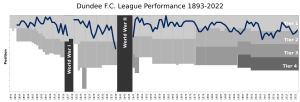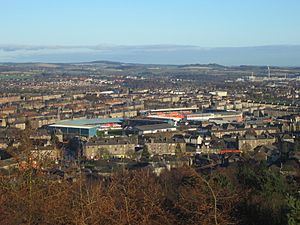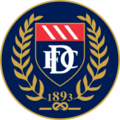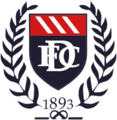Dundee F.C. facts for kids
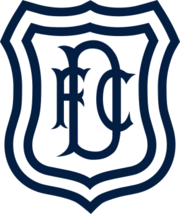 |
|||
| Full name | Dundee Football Club | ||
|---|---|---|---|
| Nickname(s) | The Dee, The Dark Blues | ||
| Founded | 1893 | ||
| Ground | Dens Park | ||
| Capacity | 11,506 | ||
| Chairman | Tim Keyes | ||
| Head coach | Steven Pressley | ||
| League | Scottish Premiership | ||
| 2015–16 | Scottish Premiership, 8th | ||
|
|
|||
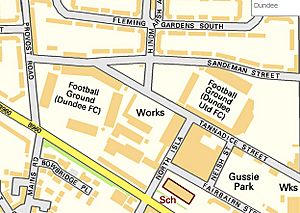
Dundee Football Club is a professional football team from Dundee, Scotland. The club started in 1893. Fans often call the team "The Dark Blues" or "The Dee." They play their home games at Dens Park and are currently in the Scottish Premiership league.
The club was formed when two local teams, Dundee East End and Dundee Our Boys, joined together. This helped them get into the Scottish Football League. Within ten years, they became a strong team in Scottish football. They finished second in the league three times in the 1900s. In 1910, they won the Scottish Cup.
Dundee remained a top team until the 1930s when they faced some challenges. After the Second World War, the club got stronger again in the late 1940s and 1950s. Under manager George Anderson, they finished second in the league once more. They also won the Scottish League Cup two years in a row, in 1952 and 1953.
The 1960s were Dundee's most successful time. With Bob Shankly as manager, Dundee won the Scottish Football League title in 1962. The next season, they reached the semi-finals of the 1962–63 European Cup. The club won the League Cup again in the 1973–74 season. Since the late 1980s, the club has faced frequent relegations and financial problems. However, they have found more stability recently.
Dundee has a big rivalry with Dundee United. Their stadiums are on the same street, making it the closest football derby in Great Britain. Games between them are called the Dundee derby. These matches are very exciting and competitive. Even so, the rivalry is friendlier than other Scottish derbies, like the Old Firm. Families often have supporters for both teams.
Contents
Club History and Achievements
Early Days and First Trophies
Dundee F.C. began in 1893. It was created by combining two local clubs, East End and Our Boys. The goal was to join the Scottish Football League (SFL). They succeeded and played their first league game on August 12, 1893. It was a 3–3 draw against Rangers at West Craigie Park.
The first ten years were tough for Dundee. Their best league finish was fifth place in 1895–96 and 1896–97. They also reached the semi-finals of the Scottish Cup twice. In 1895, they lost to Renton, and in 1898, they lost to Kilmarnock. On October 26, 1895, Dundee lost a league game 0–11 to Celtic. This is still a club record for their biggest league loss.
Things started to get better around 1900. In 1899, Dundee moved to their current home, Dens Park. In the 1902–03 season, they finished second in the league. They only let in 12 goals that season, which is still a record for any British club in a full league season.
Dundee also finished second in the league in 1906–07 and 1908–09. Both times, they were just behind Celtic. In the 1908–09 season, they missed the title by only one point. From 1902 to 1913, Dundee lost only 16 league games at Dens Park out of 154 played. They were unbeaten at home during the 1909–10 season.
Even though they didn't win the league, Dundee found success in the Scottish Cup. In the 1909–10 season, Dundee won their first major trophy. They beat Clyde in the Scottish Cup final. It took them three games to beat Hibernian in the semi-final. Then, it took three more games to defeat Clyde in the final. The winning goal was scored by John 'Sailor' Hunter.
Football was greatly affected by the First World War starting in 1914. Many players were called up for military duty. In 1917, Dundee and Aberdeen were asked to leave the league. This was because of the high travel costs for other clubs. League football started again in 1919. Dundee's strong home form helped them climb the league again. They finished fourth in 1919–20, 1920–21, and 1921–22. They were unbeaten at home in 1921–22. However, they couldn't quite win the league championship.
Dave Halliday joined Dundee in 1921. He became a fantastic centre-forward for the team. In the 1923–24 season, he was the top scorer in Scotland with 38 goals. This is still the club record for most league goals in a single season. With Halliday, Dundee reached the 1924–25 Scottish Cup final. They led Celtic 1–0 at halftime but lost to a last-minute goal. Halliday scored 103 goals in 147 games for Dundee.
Mid-20th Century Revival
The time after the Second World War was a great period for Dundee Football Club. They had been relegated before the war. But in 1946, they started in the second division. Within five years, they were second in the Scottish League Championship. They also won their first trophy in 41 years.
Dundee won back-to-back 'B' Division titles. This earned them promotion in 1947 under manager George Anderson. Just two years later, they were very close to becoming champions of Scotland. In 1947, Dundee set a British football record. They won 10–0 in two league games in a row. They beat Alloa Athletic away and Dunfermline Athletic at home.
The club soon won more trophies. They spent a world record transfer fee of £23,500 on Billy Steel. This was a lot of money at the time. They then won the Scottish League Cup in 1951. It was a very exciting final at Hampden Park.
One year later, the team returned to Hampden. They became the first team to win the League Cup two years in a row. Between these wins, they also played in the 1952 Scottish Cup Final. Great players like Bill Brown, Tommy Gallacher, Doug Cowie, Alfie Boyd, Bobby Flavell, and Billy Steel were part of this successful team.
In the 1958–59 Scottish Cup, Dundee had a surprising 1–0 loss to Fraserburgh. This is often seen as one of Dundee's most embarrassing defeats.
The Golden Age of the 1960s
Bob Shankly became manager in 1959. Dundee became champions of Scotland when they won the Division One title in the 1961–1962 season. Key players included Bobby Cox, Bobby Wishart, Pat Liney, Alan Cousin, Andy Penman, Hugh Robertson, Alan Gilzean, Alex Hamilton, Bobby Seith, Gordon Smith, and Ian Ure. They won the title by beating St Johnstone. This win also sent St Johnstone down to the Second Division. Gordon Smith made history by being the only player to win the Scottish championship with three different clubs.
In the 1962–1963 season, Dundee reached the semi-finals of the European Cup. They beat strong teams like 1. FC Köln, Sporting CP, and R.S.C. Anderlecht. Dundee eventually lost to AC Milan in the semi-finals. However, they did win their home game against Milan at Dens Park.
The Dee reached the Scottish Cup final again in 1964. Shankly left Dundee in February 1965.
After Shankly, former player Bobby Ancell became manager. Ancell led Dundee to the 1967–68 League Cup final. They played against Celtic, who had won the European Cup the season before. Ancell's team scored three goals at Hampden Park but still lost 5–3.
Dundee also reached the semi-finals of the 1967–68 Inter-Cities Fairs Cup. This competition was a predecessor to the UEFA Europa League. Dundee beat teams from the Netherlands, Belgium, and Switzerland. They then met Leeds United in the semi-final. After a 1–1 draw at Dens, Leeds won the second game 1–0 and advanced.
Later 20th Century Highlights
In 1973, under manager David White and captain Tommy Gemmell, the Scottish League Cup returned to Dens. They won 1–0 against Celtic.
In 1986, Dundee had a famous 2–0 victory over Hearts at Dens Park. This win on the last day of the season stopped Hearts from winning their first league title in 26 years. Hearts had been unbeaten for a long time. But two late goals from substitute Albert Kidd for Dundee, combined with Celtic's big win, meant the league title went to Glasgow.
21st Century Challenges and Comebacks
In 2000, the club made headlines by signing Argentine international Claudio Caniggia. He later played for Rangers. Caniggia was one of many international players Dundee signed in the early 2000s. This also included former Newcastle United player Temur Ketsbaia. Signing these famous players helped Dundee reach a Scottish Cup final and finish in the top six twice.
This success happened first under manager Ivano Bonetti and then under Jim Duffy. However, the number of fans attending games was not as high as hoped. The club was spending much more money than it was earning. This led Dundee into financial trouble.
Before their financial problems, Dundee had a great run in the Scottish Cup in 2003. They beat Partick Thistle 2–0 away. Then, they knocked out Aberdeen 2–0 at Dens Park. Dundee continued their journey to Hampden Park. They drew 1–1 away with Falkirk, then won 4–1 in extra time at Dens. This put them in the semi-finals against Inverness CT at Hampden Park. A goal by Georgi Nemsadze secured a 1–0 win. This meant they reached the Final against Rangers. In the final, Dundee's Barry Smith hit the post. But Lorenzo Amoruso scored for Rangers, ending Dundee's cup run.
Later that year, the club faced a huge debt of £23 million. This was because they couldn't sell players as planned and didn't earn enough money. Many players, like Fabian Caballero and Georgi Nemsadze, left in 2005. Despite this big debt, Dundee survived by selling their stadium in 2003. But the club was then relegated to the second tier of Scottish football. They stayed there until July 2012. By mid-2006, the club had reorganized its finances and became debt-free.
In 2007, James and Peter Marr, who owned the club, reduced their involvement. They stepped down as chairman and Chief Executive. Bob Brannan and Dave MacKinnon took their places.
In 2008, after a poor run, manager Alex Rae was sacked. Former manager Jocky Scott took over for his third time with the club.
In the 2009–10 season, Dundee won the Challenge Cup Final. They beat Inverness Caledonian Thistle 3–2.
In March 2010, Scott was sacked as manager. Gordon Chisholm took over. In September 2010, Dundee was again close to financial administration. This was due to an unpaid tax bill. On November 1, 2010, the Scottish Football League punished Dundee by taking away 25 points. This left Dundee at the bottom of the First Division table with -11 points. On December 17, 2010, Dundee's appeal against the points deduction was rejected. Despite this, Dundee went on an amazing 23-match unbeaten run in the First Division.
On May 12, 2011, Dundee FC came out of administration. The club's supporters' trust became the main shareholder. On July 16, 2012, Dundee was invited to join the Scottish Premier League. This happened after Rangers faced financial problems and moved to the fourth tier.
After an unsuccessful season in the Premier League, Dundee was relegated again. This happened despite improved form under new manager John Brown. The next season (2013–14), Dundee played in the Scottish Championship.
New Ownership and Recent Success
In the summer of 2013, a takeover by a Texan-based group was completed. Tim Keyes of Keyes Capital became the main investor. The 2013–14 season was memorable. Dundee won the title and promotion to the top league on the last day. They beat Dumbarton 2–1. After some tough results, manager John Brown was replaced by Paul Hartley. Dundee secured promotion to the Scottish Premiership.
Paul Hartley quickly signed many new players for the top league. On the opening day of the 2014–2015 season, Dundee drew 1–1 with Kilmarnock at home. Dundee won their first game of the season on August 23, 2014. They beat St Mirren 1–0 away. This made them unbeaten in their first four league games. Dundee also started the League Cup well with two 4–0 wins.
Dundee managed to get a top-six spot by mid-April. This secured their place in the Premiership for the 2015–16 season. They confirmed this after Kilmarnock lost to Aberdeen. A derby victory against Dundee United also helped.
In June 2015, Bill Colvin stepped down as chairman. Tim Keyes became the new chairman.
Dundee finished eighth in the 2015–16 Scottish Premiership. They famously relegated rivals Dundee United at Dens Park.
Dundee was relegated to the Scottish Championship at the end of the 2018–2019 season. Former player James McPake became manager. The club finished third in the next season, which ended early due to the COVID-19 pandemic. The following season, they finished second. In the play-offs, Dundee beat Raith Rovers and Kilmarnock. This earned them promotion back to the top flight after two seasons. After another relegation, Dundee won the 2022–23 Scottish Championship under manager Gary Bowyer.
In January 2024, Dundee announced a partnership with ALK Capital, who own Burnley F.C. This partnership focuses on developing players for both clubs. In November 2024, Dundee also partnered with Mexican club Monterrey.
Club Stadium: Dens Park
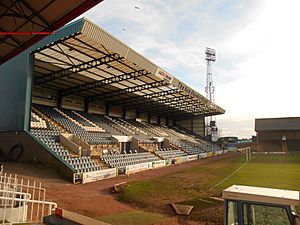
Since 1899, Dundee has played its home games at Dens Park. The stadium can hold 11,775 fans. What's special is that Dens Park shares the same road, Sandeman Street, with Tannadice Park. Tannadice Park is the home of their city rivals, Dundee United.
In 2002, there were plans for a new stadium in Dundee. This was part of Scotland's bid to host the 2008 European Football Championship. This new stadium would have been shared by Dundee and Dundee United. It would have meant leaving their historic grounds. However, when Austria and Switzerland were chosen to host the event, these plans were put on hold.
In May 2009, it was reported that local businessman John Bennett owned the stadium. In October 2014, the Dundee Supporter's Society announced plans for the club to buy back the stadium from John Bennett.
In April 2015, negotiations were happening to buy back the stadium. In August 2016, club owners Tim Keyes and John Nelms bought land in the Camperdown area of Dundee. In February 2017, they said this land was for a new stadium. This was because Dens Park was becoming expensive to maintain.
In May 2018, the stadium was renamed Kilmac Stadium at Dens Park for sponsorship reasons. In October 2020, it was renamed Kilmac Stadium again. At the start of the 2023–24 season, the stadium sponsor changed to The Scot Foam Stadium.
In October 2023, Keyes and Nelms announced that their company had bought Dens Park from John Bennett. This was part of their plan to move the club to the new stadium at Camperdown. In February 2024, they submitted planning permission documents for the new stadium.
Club Staff and Players
Dundee Football Club has a team of dedicated staff and players. The club is led by its chairman, Tim Keyes, and managing director, John Nelms. They also have a head coach, Steven Pressley, and other coaches who help the team.
The club has a first-team squad of players who play in competitive matches. They also have a development squad, which helps younger players grow their skills. Many players from Dundee have gone on to play for their national teams.
Club Rivalries
Dundee's main rivals are Dundee United. They play against each other in the exciting Dundee derby. This rivalry is special because their stadiums are less than 100 yards apart. This makes them the two closest league grounds in Britain. The close distance makes the rivalry very intense. It is one of the most exciting derbies in Scotland. While it's friendlier than other Scottish derbies, like the Old Firm, both sets of fans care deeply about these games. The derby results often shape each team's season.
Dundee was usually better in the early years of the derby. But in the 1970s, Dundee United became stronger. Recently, the teams have often been in different leagues. Dundee faced financial problems and was in a lower division for several seasons. Dundee returned to the Scottish Premiership in 2014. In 2016, a Dundee derby victory actually confirmed Dundee United's relegation. After some years where Dundee was in a higher league, the two teams met again in the Scottish Championship in 2019.
Dundee and United also have a rivalry with St Johnstone. This is because Dundee and Perth are close to each other. This is known as the Tayside derby. Dundee fans usually don't take this rivalry as seriously as the Dundee derby. However, this fixture became more important after United's relegation in 2016. A famous game between Dundee and St Johnstone happened in 1962. Dundee won 3–0 at St Johnstone's old ground. This win made Dundee league champions for the first and only time. It also meant St Johnstone was relegated.
Club Records
- Highest attendance: 136,495 fans watched the 1952 Scottish Cup final between Dundee and Motherwell. This is also a record for a club match in Scotland that doesn't involve the Old Firm.
- Highest home attendance: 43,024 fans against Rangers on February 7, 1953, in the Scottish Cup.
- Biggest league win: 10–0 against Alloa Athletic and Dunfermline Athletic in 1947.
- Biggest league loss: 11–0 against Celtic in 1895.
- Most league appearances: Bill Marsh, with 386 games from 1924–1937.
- Most appearances overall: Doug Cowie, with 445 games from 1945–1961.
- Most league goals: Alan Gilzean, with 113 goals.
- Most goals in a single match: Albert Juliussen, 7 goals against Dunfermline on March 22, 1947.
- Most league goals in a season: Dave Halliday, 38 goals in 1923–1924.
- Most goals in a season (all competitions): Alan Gilzean, 52 goals in 1963–1964.
- Longest unbeaten run: 23 games (from October 2, 2010, to March 26, 2011).
- Highest transfer fee paid: £600,000 for Fabián Caballero.
- Highest transfer fee received: £1,500,000 for Jack Hendry to Celtic.
- Oldest player: Bobby Geddes, 49 years old against Raith Rovers on April 21, 2010.
- Youngest player: Andy Penman, 15 years and 352 days old against Hearts on February 7, 1959.
- Youngest goalscorer: Craig Wighton, 16 years and 105 days old against Raith Rovers on November 9, 2013.
Club Honours
Dundee Football Club has won several important titles throughout its history:
League Titles
- Scottish Premiership:
- Winners (1): 1961–1962
- Runners-up (4): 1902–1903, 1906–1907, 1908–1909, 1948–1949
- Scottish Championship:
- Winners (6): 1946–1947, 1978–1979, 1991–1992, 1997–1998, 2013–2014, 2022–2023
- Runners-up (5): 1980–1981, 2007–2008, 2009–2010, 2011–2012, 2020–2021
Domestic Cups
- Scottish Cup:
- Winners (1): 1909–1910
- Runners-up (4): 1924–1925, 1951–1952, 1963–1964, 2002–2003
- Scottish League Cup:
- Winners (3): 1951–1952, 1952–1953, 1973–1974
- Runners-up (3): 1967–1968, 1980–1981, 1995–1996
- Scottish Challenge Cup:
- Winners (2): 1990–1991, 2009–2010
- Runners-up (1): 1994–1995
European Competitions
- European Cup:
- Semi-finalists (1): 1962–1963
- Inter-Cities Fairs Cup:
- Semi-finalists (1): 1967–1968
Other Trophies
- Forfarshire Cup:
- Winners (28): 28 times
- Evening Telegraph Challenge Cup:
- Winners (1): 2006
- Tennents' Sixes:
- Winners (1): 1988
Images for kids
See also
 In Spanish: Dundee Football Club para niños
In Spanish: Dundee Football Club para niños
 | Selma Burke |
 | Pauline Powell Burns |
 | Frederick J. Brown |
 | Robert Blackburn |


